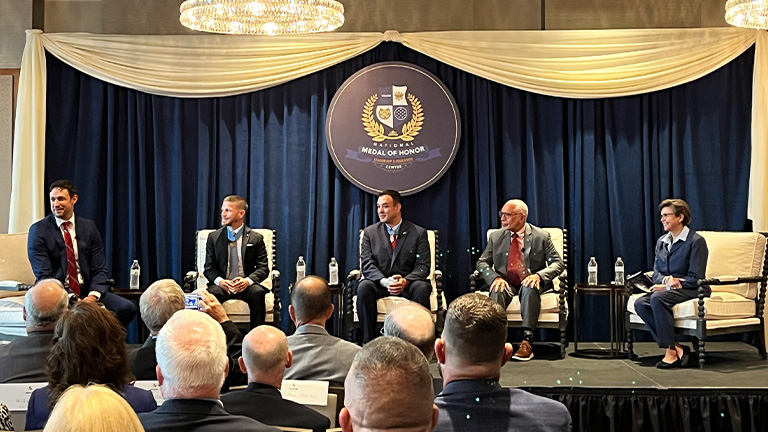“Inspiring America’s Leadership — Meet Your Moment” panelists including, left to right, moderator: Justin Habash, Ph.D., Assistant Dean for Teaching and Learning, Johns Hopkins Carey Business School; Panelists: Kyle Carpenter, Medal of Honor Recipient, War on Terrorism (Afghanistan); Leroy Petry, Medal of Honor Recipient, War on Terrorism (Afghanistan) and President, Congressional Medal of Honor Society; The Honorable Charles Bolden, MajGen USMC (Ret.), 12th Administrator, NASA; The Reverend Doctor Margaret Grun Kibben, Chaplain, U.S. House of Representatives, Rear Admiral, U.S. Navy (Retired), 26th Chief of Chaplains, US Navy.
Army Sgt. Leroy Petry had a decision to make. As the jumpmaster on a training flight over the Northwest, Petry had the final say on the mission, but the jump platform was too slick and risked injuring the paratroopers on their way out of the C-17.
Some on his team urged him to go ahead. Canceling the jump would cause lots of headaches. Plus, they were Rangers, after all, and could manage. But Petry knew better – he knew what the procedures called for, and he knew this wasn’t worth risking the possible death or injury of those on the plane. He canceled the jump.
“I knew it was the right thing to do, and I will defend it every time,” Petry said.
Petry recounted the story at the first-ever event of the National Medal of Honor Leadership and Education Center (NMOHLEC), an organization devoted to teaching leadership to professionals and college students using the six core values of the Medal of Honor: courage, sacrifice, integrity, commitment, patriotism, and citizenship.
This first symposium, “Inspiring America’s Leadership — Meet Your Moment”, was held Aug. 1, at the University of South Carolina. The panel included Petry and Kyle Carpenter, who both received the Medal of Honor, the nation’s highest award for military valor in combat, for their actions in the War on Terror.
The discussion focused on the importance of defining and implementing core values in leadership and how to create a values-based culture in organizations, whether it’s on a ship, on the battlefield, or in a corporate boardroom.
In a talk before the panel, Dr. Allan Lind, a professor emeritus of leadership at Duke University’s Fuqua School of Business, spoke of how people must decide whether to follow a leader. Whether they do it is often based on whether people share values with their leadership; whether the leader is willing to invest as much as the follower and whether the follower will be treated fairly.
“Leaders have to show their values, and they have to communicate them to the people they seek to lead,” he said.
Other panelists included the Honorable Charles Bolden, Jr., a retired major general in the Marines, astronaut and former administrator of the National Aeronautics and Space Administration, and the Reverend Doctor Margaret Kibben, a retired rear admiral who served as chief of chaplains in the Navy and currently as the chaplain of the U.S. House of Representatives.
Leading the discussion was Dr. Justin Habash, director of education and leadership programs at the NMOHLEC and assistant dean for teaching and learning at the Johns Hopkins University Carey School of Business. Habash is also a former Army ranger.
“Many businesses will identify what their mission statement is and what their vision is, but it’s only recently that I’ve come to hear them talk about how they’re identifying what matters to them,” Kibben said. “It’s important to identify first what matters to you and then to keep small accounts in how you’re staying true to what matters. It’s to look at the end of the day and ask, ‘How did we live up to what matters today?’ Why? Because pro-action facilitates reaction.
“If you’re proactive in living out what matters then things go wrong, you’re able to react appropriately because you already have the muscle memory. You’ve built it into the climate. You’ve built it into the team.”
Bolden added values-based leadership begins with integrity. “It’s difficult to get a young Marine to commit to something if he or she doesn’t believe you’re being honest with them,” he said. “My job was to make my Marines believe it was their mission – not mine.”
That involved including a diversity of opinions, even from the lowest-ranking members of the team. “I wanted to hear from everybody in the room,” he said.
He added: “Integrity either undergirds or undermines your moral code. If you don’t remain true to it, everything falls apart.”
Carpenter recalled the time as a frustrated young Marine that a new leader took over his team and the difference he made.
“He never yelled,” Carpenter said. “He spoke with a purpose. He took the time to make sure we understood the lessons of the day, just taking a few minutes to show he cared.”
He added: “Obviously you need good communication but to be a good leader you don’t necessarily need words. This is true in the business world and the corporate world, too. Take a few extra minutes, put your arm around them, and show them that you care. It can be life-altering.”
Additional symposiums are under development and dates will be released soon.

